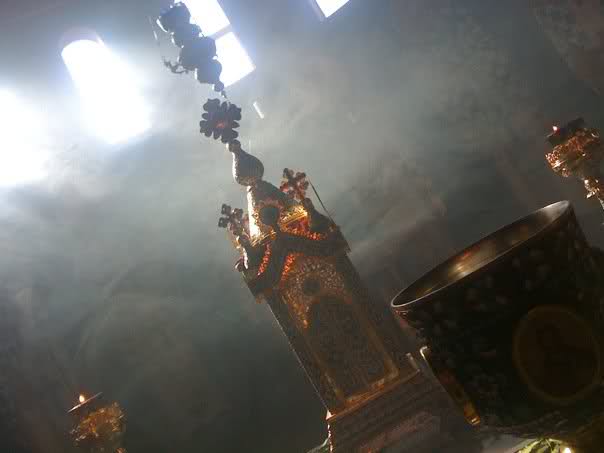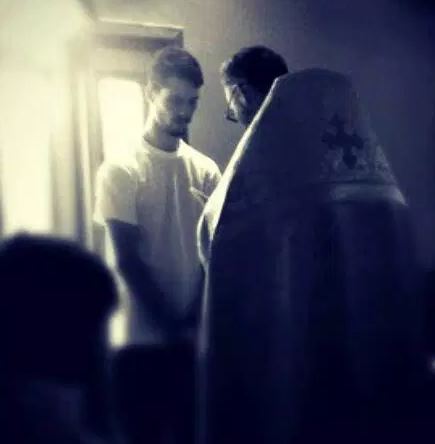
by Wesley Giesbrecht
The Scales Tip
All throughout the time of my journey, unknowingly, towards Orthodoxy I had this strange intuition that the Orthodox Church was right but it was as if within me there was an Orthodox and a Protestant arguing against each other and time after time the Protestant won. I can recall a specific moment not long before I had coffee with my Orthodox friend when I was on a bus coming home from Winnipeg with the youth after having finished spending the evening at Teen Challenge. I was looking out the window into the city and thought to myself,
“There’s still just too much Protestant in me”.
The night after I had coffee with my friend and the strange experience with the icon the scales tipped. Whatever the Protestant said no longer had any sway. I wanted to become Orthodox. It was both a moment of sweet joy and horrible fear.
Back to the Beginning
I still had all these questions about Scripture, Tradition, Authority, and the Early Church but my friend to thrown out some names of ancient Christians that I should read; names like Polycarp and Ignatius of Antioch. I decided that I would find out what happened after the book of Acts. I realized that I suffered from a condition of historical amnesia. I knew nothing about what happened between the time of Acts and the Protestant Reformation. I ‘knew’ that somewhere in there the Church fell into apostasy and the Roman Catholic Church emerged. This is generally what I heard from the people around me about Church history. I knew a little bit more than that; such as the Great Schism of 1054 and some of the Latin developments afterwards. I was also a part of a Christian community that seemed to be obsessed with rediscovering the Church of Acts except their approach was to read the book and try to implement some of it’s characteristics into their own church structure and organization. My thoughts were this,
“Shouldn’t we see what happened after the book of Acts to see where the Church was ‘lost’?”
So I took it upon myself to find out what happened. I did some research and found out that these guys my friend told me about were in fact disciples of the Apostle John! I ordered myself a copy of the ‘Apostolic Fathers’ as well as some other early Christian writers such as St. Justin Martyr and St. Irenaeus of Lyons. When I read these second century Fathers my intuition that Orthodoxy might in fact be right and be the Church that has continued to live the life of the early Church was confirmed. What I found was liturgical worship, an episcopal structure, sacraments, an emphasis on tradition and the Church being the context for reading Scripture, and my theology I had worked on and molded was staring me in the face in the writings of St. Irenaeus.
The more I read the early Fathers and looked into early Christian history and practice (such as the icons in the Roman Catacombs or the Hymn to the Mother of God from the third century) that before there was a canonized New Testament the Church gathered around their bishops who were in apostolic succession through their ordinations to celebrate the Eucharistic Liturgy (and they believed that the Eucharist was truly the body and blood of Christ), they maintained Apostolic Tradition, and they practiced such things as venerating relics of martyrs (as in the case with St. Polycarp), singing hymns to the Mother of God, making the sign of the cross, baptizing infants (and believing baptism to be regenerating), reading the Septuagint, among other practices. I now understood the Orthodox claim to being the One, Holy, Catholic, and Apostolic Church; and I believe it.
Saturday Night Orthodoxy
I made my way to the decision of wanting to become Orthodox but I had never even been to an Orthodox Church! My friend had once told me about a Church in Winnipeg called St. Nicholas so I decided to send them an email. Eventually I got a reply and I made the drive up to attend the Divine Liturgy of St. John Chrysostom in an Orthodox Church for the first time on Lazarus Saturday 2014. I had no idea what was going on but I felt at peace and a quiet joy.
After the Liturgy I spoke to the priest briefly and expressed my desires to become Orthodox. Over the next few months I would come up from Winkler to attend the Saturday evening ‘Vespers’ service and once in a while the priest (Fr. Gregory Scratch) would come down to Winkler to chat. During this time I slowly began to drop out of all the commitments I had made to the church I was attending (quitting the worship bands, not doing intros anymore, stepping down from running the projector, etc..) and the more I attended Vespers the more restless I became Sunday mornings at the church I was attending.
Sunday School and the Sermon
At this time I still had to finish the Sunday School year and the youth year and I decided to finish what I had started. We had finished the commentary on the Gospel of John but we needed something to do for the remaining weeks and I was hesitant to teach anything that I would no longer be able to teach in good conscience. I had also been asked by the pastor of the church to give a sermon. I began to read ‘The Screwtape Letters” by C. S. Lewis to my class and prepared a sermon on theosis for the congregation. On the day of my sermon I was reading to my class as normal when suddenly the topic of baptism came up.
One of the young women retorted that baptism was simply a profession of faith. I began to bring up certain passages of Scripture that speak about baptism being our participation in the death and resurrection of Christ and that even in one place it says quite explicitly,
‘baptism now saves you’.
“BAPTISM DOESN’T SAVE YOU, JESUS SAVES YOU!” was her reply.
I don’t handle well when people become antagonistic. I get worked up and become antagonistic myself. I then proceeded to spend the rest of the time ranting about how baptism is a gift by which we are freed from our bondage to sin and made real members of the body of Christ. When class ended I went upstairs and preached a sermon, which was far too academic for anyone’s good, about the centrality of theosis in the Christian life. A few days latter I got a call from the pastor; the ministerial wanted to have a meeting with me.
The Meeting
That Friday I went to the church. I had decided that I was going to play my cards and announce my departure to become Orthodox. I had written up a big letter attempting to explain why I was doing what I was doing and brought along a few copies with me. When I got to the church I got straight to business and said what I wanted to say. They were kind to me about everything, though a few uncomfortable questions were asked. In the end they didn’t bless my decision but they let me go.

Enter the Catechuman
Two days later, on the Feast of Pentecost I was made a catechuman in the Orthodox Church. Three months later on the Sunday before the Feast of the Elevation of the Holy Cross I was baptized and chrismated into the Orthodox Church.
Some Final Words
This is but the core of my journey and obviously there were other things that happened that had an impact but I feel that this was as comprehensive a description of my journey as I can make.

Thank you very much for sharing your story. May the All-Holy Trinity guide you and enlighten you as you continue your journey. You will find that Orthodoxy is even deeper, richer and more profound than you can imagine. Welcome to the Church.
I like this “journey” stories. Especialy, and please without offendings, when they come from protestants. My personaly opinion that the only coherent protestant theology which I have confronted is that of Paul Tillich, which is not very fas from many church fathers I think. I like the fact that more and more post reformative christians embrace the original church, although this number is for now small.
It would be interesting for me to read the “journey” story of Richard Swinburne, if there would be one.
Forgive me my english, greetings from Croatia.
Good set of articles. I have learned much from Orthodox.blogs, books, lectures etc.
But having grown up in a country where the Oriental Orthodox (Coptic) was the state church I have reservations about the tendency to Constantineism within the Orthodox and I see their divisions and differences being almost as big as those in Protestantism.
As with many other Orthodox you reject all doctrines held by Calvinists and I am a convinced monergist. You say that you reject total depravity. Pray tell which part of the human makeup was not damaged and distorted by our original rejection of God’s way?
Dawit
Dawit,
We do not ‘reject’ all the doctrines held by Calvinists. Calvinists hold a few Orthodox positions (the divine hypostasis, and two natures of Christ, for example). Also, we do not consider something totally depraved just because it was damaged or distorted by sin. That is a false dichotomy – either absolutely perfect or totally depraved. My car may be old, and have the dents of several fender benders, but it still runs. One scratch doesn’t mean I’m getting rid of it. Thanks for identifying your position though.
If you wish to discuss the differences in Orthodox and Calvinist theology, write me privately after you have looked at our articles on Calvinists.
And thanks for writing!
That was fantastic, and has helped me with a number of theological issues too: particularly on Mary and Jesus assuming a real body, becoming really part of this world, so of course the Church isn’t simply invisible, but is visible. I so admire and envy your honesty.
And I also admire and envy the way you lay your soul open before all to see, and seem to not care what people think. Thank you so much for posting this.
Thank you for sharing your journey. We’ve Been on a similar journey with our whole family converting (all 5 of us) to Orthodoxy here in Oakland, CA.